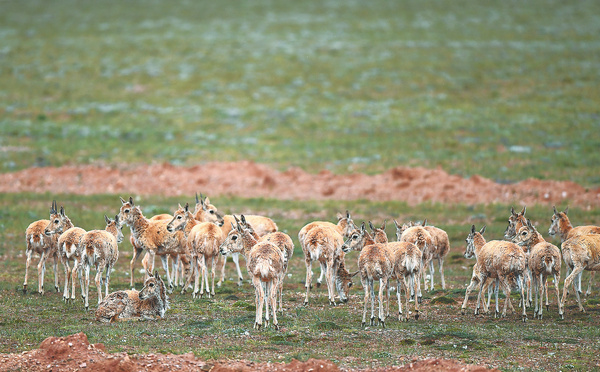Legal protection of parks highlighted

Tibetan antelopes are a flagship species in Sanjiangyuan National Park. [Photo/Xinhua]
As part of China's continuing efforts to maintain biodiversity and achieve sustainable development, the Supreme People's Court (SPC) recently publicized the details of 10 cases to underscore the importance of legal protection for national parks.
The SPC released the details on Tuesday to explain related laws and raise people's awareness of them and the authorities' zero-tolerance attitude toward environmental depredation.
China announced its first batch of national parks in 2021 — Sanjiangyuan National Park, Wuyi Mountain National Park, Giant Panda National Park, Northeast China Tiger and Leopard National Park, and Hainan Tropical Rainforest National Park — with the aim of protecting the integrity of their ecosystems while making use of valuable natural resources scientifically and rationally.
Local courts had earlier launched an intensified crackdown on behaviors threatening the environment, like deforestation and smuggling.
One of the cases detailed by the SPC involved illegal mining in Guangze county, Fujian province, from 2016 to 2017.
The two principal conspirators, one of whom was allowed to work in a piece of forestland in the Wuyi Mountain National Park, conspired to profit from the mining of valuable rare earth metals and extracted 9.3 metric tons of rare earth under State protection without the necessary permit.
They both pled guilty to illegal mining in Guangze County People's Court in 2019 and were each sentenced to four years and nine months in prison and fined 150,000 yuan ($20,500). The court said they had also harmed the stability of the park ecosystem by destroying vegetation, polluting water and causing soil erosion.
The SPC emphasized that environmental crimes had long-lasting impacts and needed to be punished with the utmost severity. With the establishment of the environment-related public interest litigation system in 2013, offenders may face civil penalties as well as criminal charges.
It also released details of a case involving a complete illegal industrial chain — from hunting to marketing — that exploited endangered animal species in Sichuan province, which encompasses the core area of Giant Panda National Park.
From 2019, the main defendant had asked other people to hunt endangered wild animals for commercial use and secretly sent them to private zoos.
Eighteen golden snub-nosed monkeys, rare animals under first-level State protection, and 18 red pandas, rare animals under second-level State protection, were illegally captured. One of the golden snub-nosed monkeys and 11 red pandas died as a result of maltreatment.
Last year, the Ya'an Intermediate People's Court in Sichuan sentenced the main defendant, who pled guilty, to 14 years in prison and fined him 500,000 yuan for illegal hunting and trafficking.







